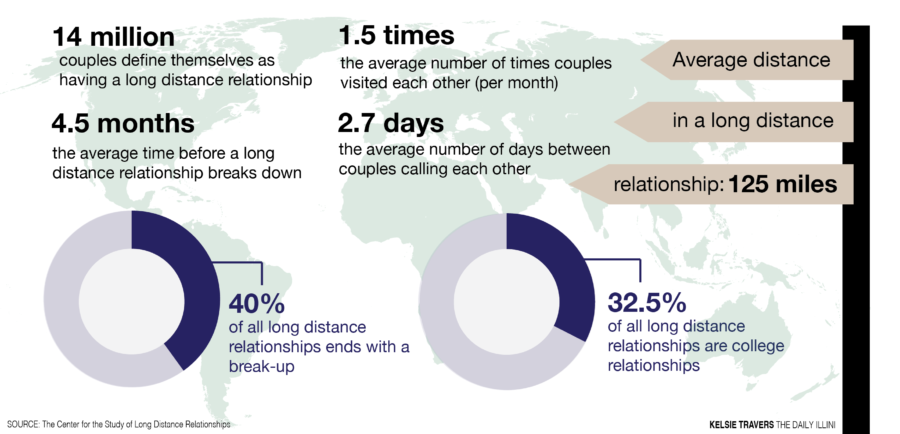Long distance relationships: Breaking the physical barrier
October 21, 2015
Laura Hill, junior in Media, and her boyfriend, Mark Patterson, are currently oceans away from one another, with Hill studying abroad at the University of Otago in New Zealand for the semester. She said it can be difficult not being in the same time zone as Patterson, especially since there is a 17-hour difference.
“Sometimes I want to call and tell him something, but it’s 3 a.m. in the States,” she explained. “But on the flip side, it’s also funny to open the occasional drunk Snapchat while I’m in class in the middle of the day.”
She also said it is bittersweet seeing him hang out with her friends abroad.
“You don’t know FOMO until you get a dozen pictures from your sorority sisters of them hanging out at Kam’s with your boyfriend,” Hill said.
Get The Daily Illini in your inbox!
Hill said that her and Patterson talk over FaceTime and email fairly frequently. She said she feels lucky to have today’s technology, which makes more than 8,000 miles feel like nothing at all.
“Exploring the infinite New Zealand abyss means that sometimes I’m off the grid for several days and don’t have communication with anyone, but when I’m in a place with a phone signal, we can be in almost constant communication though text, email or Snapchat,” she said.
Historically, long-distance relationships are nothing new. According to professor of anthropology Stanley Ambrose, humans used to travel in troops but eventually made the transition to tribes over the years.
Ambrose said he accredits the Internet as a helper when it comes to social networking because distance no longer matters.
However, Ambrose said he believes that it can be difficult to keep a long-distance relationship intimate.
“It takes more than words,” he explained.
Ambrose explained a relationship’s need for intimacy is based off of biology, specifically the hormone oxytocin, which causes attachments between people. He said reaching out to a friend or partner in person increases oxytocin levels as well as eye contact; thus, without that in-person contact, or even just eye-contact, a person gets less oxytocin.
“You must have Skype or FaceTime, so you can look at one another over just texting,” he said. “Just texting doesn’t do it. What you want is someone you can talk to, someone who gives you unreserved compliments and support.”
This is not the first time Hill and Patterson have been miles apart. Patterson attended the University of Minnesota his freshman year before transferring to the University.
“I think that taking a huge step in our lives (starting college) without each other nearby trained us to be great communicators. When I was leaving for New Zealand, I was taking another big step in my life, but this time, I had no worries about how our relationship would hold up,” Hill said. “Although being together in person is obviously preferable, lengthy intellectual conversation has always been one of my favorite parts of our relationship, which is easy to maintain over any distance. I think being far away from each other has helped us reach a point where there is never a lag in conversation.”
Even though Patterson is in Champaign and Hill is in New Zealand, they have made sure to see each other in person. Over the summer, Patterson visited her for eight days.
Perla Torres, senior in LAS, is also in a long-distance relationship. Her boyfriend of three years goes to school in Chicago. Torres calls or texts him at least once every day, making sure she visits him every two to three weeks. At the beginning of the relationship, they would Skype, but as they both got busier with school, they decided to text, call and voice chat more often than video chat.
Torres said it can be hard to watch other couples on campus.
“It’s hard seeing other couples on campus and not being able to have that or being able to see each other every day,” she said. “You don’t want to have to be missing them.”
However, Torres said there are also pros of being in a long-distance relationship.
“The benefit is you don’t have to worry about not spending enough time with them. You’re able to do your own thing. Since I don’t have to worry about seeing him every day or not allocating time to hang with him, I can go to club meetings and do my own thing,” she said. “People say having a relationship can be really distracting, and I feel like it could be true, but since I don’t have this physical distraction, I can do better.”







